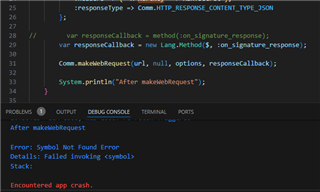I know this has to be a silly error... A foreground makeWebRequest (if I'm running a CIQ 5 device). This is in a module (not a class). I first tried to setup the callback and got "Symbol 'method' not Found". This forum showed that I need to instantiate it using "new Lang.Method()". Now I'm getting past the makeWebRequest but getting a Symbol Not Found error without any context on line number or the offending symbol. Any ideas?


